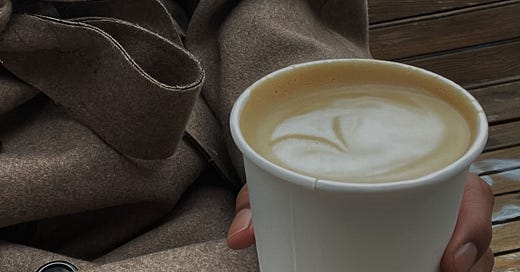“It’s about making it real to your senses,” said 91-year-old actress Ellen Burstyn, when asked about method acting on Woman’s Hour recently. “And your senses respond.”
This comment struck me because it tapped in to something I’d been thinking about: how our senses have the power to completely transform how we feel. As always with these things, once I started thinking about it, I started seeing it everywhere.
Julia Samuel wrote this week about using our senses to connect with our past selves, or deal with grief. And La Roche-Posay shared a moving post about the healing power of touch during cancer treatment.
Then I read that life coach Constanze Spagnolli is leading a retreat based around the senses at the aptly-named Cape of Senses five-star spa hideaway in Lake Garda next month.
“Our senses - sight, hearing, taste, touch and smell - are more than tools for perceiving the world; they’re integral to our overall wellbeing,” Constanze told me when I contacted her for more info. “Engaging consciously with them can help us manage stress, maintain emotional balance and even improve cognitive function.”
She’s right about the cognitive effects. Professor Claire Steves told the ZOE podcast earlier this year that wearing hearing aids if you need them can reduce your risk of dementia, because not being able to hear properly is a contributing factor to the disease - it inhibits your brain’s function.
And it turns out that deliberately using our senses to improve our energy or mood is a thing - it’s called “sensehacking”, and experimental psychologist Charles Spence wrote a whole book about it.
Anyway, as much as we would all love to escape to Lake Garda in November for Constanze’s retreat, that is clearly not possible for most of us, so I asked her to share some ways that we can “hack” our senses to improve our health and wellbeing.
Sight
What your brain learns through your eyes has a huge impact on mental health, so drag your attention away from bleak headlines or that crime drama.
“Take even just 10 minutes each day to focus on nature,” suggests Constanze. “Go to a nearby park, or look out the window at a green landscape. Choose a colour to focus on, such as the green of the leaves or the blue of the sky. This helps calm the mind and establish a deeper connection with nature.”
There’s science to back this up. “Viewing natural landscapes promotes stress reduction by lowering the release of stress hormones and enhancing well-being, according to research, and observing the environment increases activity in the prefrontal cortex, associated with better emotional regulation and reduced stress.”
Hearing
We all know the power of music to relax or energise us: from the pounding playlist that gets us through a run, to the soothing music in a spa. So think about that consciously, and ensure that what you’re listening to is serving its purpose.
“Pay attention to how the music affects your body and emotions,” says Constanze. “Do you feel your pulse calming or your mood lifting?”
But don’t forget about the power of silence. I used to hate silence, and would constantly have music on but, since having children, silence feels like a luxury now.
Constanze recommends scheduling 5-10 minutes of absolute silence each day. “Sit in a quiet place, and focus only on your breathing,” she says. “When thoughts arise, let them pass without clinging to them. This helps promote mental clarity, calm and focus. You can do this during a lunch break or after a hectic workday.”
Smell
Lemon and peppermint are known as invigorating scents, and I’ve realised that I already use these for an energy boost throughout the day, squeezing lemon on my lunch and keeping a peppermint moisturiser on my desk. And just the smell of coffee can sharpen your brain, before you even take a sip.
In the evening, lavender and chamomile are most calming, which explains why I deeply inhale the steam from my favourite nighttime tea and instantly feel relaxed. Constanze explains that scents have a direct effect on our limbic system, influencing emotions and well-being.
However, being one of the most evocative senses can backfire. I tried to make chemo more bearable by bringing nice drinks and products with me. Now, though, the smell of banana smoothie and my most-loved hand cream that I used on the chemo ward makes me want to throw up.
So be warned: don’t taint a favourite smell with a bad experience.
Touch
This is one of my favourites. From pulling a soft blanket over me on the sofa, to giving the kids back massages before bed - I’ve always been very aware of how touch makes me feel. And very aware of when I’m uncomfortable or don’t like being touched.
Unfortunately the materials that feel the nicest are often the most expensive, but it’s one thing that I’m prepared to invest in, because I love wearing cashmere in the winter and resting my head on a silk pillowcase. Whenever anyone asked for my advice on what to get someone going through chemo, I’d always say some posh cashmere socks or silky pyjamas. It makes you feel instantly soothed - and doesn’t seem to come with the post-trauma hangover that smells did for me.
And let’s not forget one of the most powerful forms of touch - a hug - the quickest way to flood your body with oxytocin, the love hormone.
Taste
When I visited luxury medical spa Lanserhof in 2022 (for an article), they tried to insist that everyone ate their food without distractions, chewing each bite 20-30 times. I found this really difficult (and, to be honest, boring), and would sneak in my iPad to read the news over lunch. But Constanze says I should have done as I was told. “Especially if you tend to eat quickly or zone out,” she says. “Mindful eating helps you better understand your fullness and preferences and truly enjoy your food.”
If, like me, you don’t have the patience for mindful eating, then learn to love cooking. “Engaging multiple senses simultaneously can enhance brain activity, improve memory, and increase focus,” she says. “Cooking engages sight, smell, touch, and taste, providing a great workout for the brain.”
And it doesn’t need to be expensive or time consuming. This pretty beetroot pasta comes in at less than £1 per serving, and you make the sauce in the time it takes the pasta to cook.
This week I’m…
A bit obsessed with the scientists who debunked the Blue Zones research (as someone who was totally on board with it, I find it hilarious/horrifying that the longevity stats were boosted by… pension fraud 😂)
Trying not to think about all the microplastics accumulating inside my (and every) body
Finally catching up on the brilliant Slow Horses, starting with series one, a good two years after everyone else. Although not sure my senses appreciate watching decapitation right before bedtime 😬
Preordering The Big Book of Bread by James Morton, out next week. Bread ticks off several senses in the most joyful way, and I highly recommend @sourdough_explained on Instagram, where I could watch dough being folded aaaaall day long.









